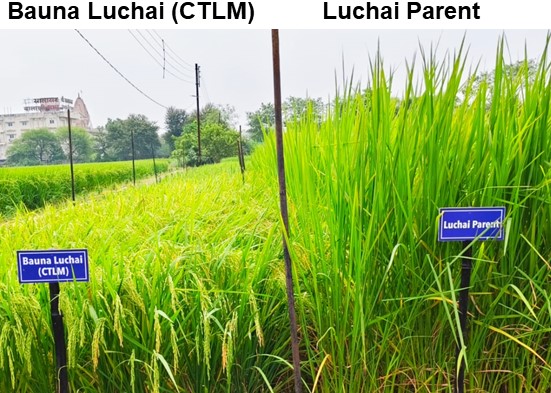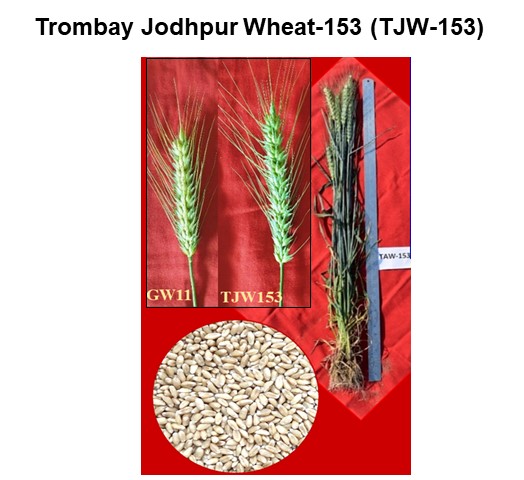Department of Atomic Energy
BARC Dedicates 8 New Trombay Crop Varieties To Farmers
In its 70th year, BARC has dedicated a total of 70 crop varieties to farmers and People of India: Director, BARC
For The First Time BARC Develops Wheat Varieties
‘Trombay Konkan Khara’ allows rice cultivation in previously non-arable brackish soils
प्रविष्टि तिथि:
06 DEC 2024 6:17PM by PIB Mumbai
Mumbai, 06th December 2024
The Bhabha Atomic Research Centre (BARC), Mumbai, has once again demonstrated its pioneering role in agricultural innovation by dedicating eight new Trombay crop varieties to farmers. Developed using radiation-based mutation breeding techniques, these high-yielding, climate-resilient, and non-GMO crop varieties are set to revolutionize agriculture across India.
The varieties include five cereals and three oilseeds, tailored to diverse agricultural conditions in collaboration with state agricultural universities. Speaking at the launch, Dr. Ajit Kumar Mohanty, Secretary of the Department of Atomic Energy (DAE) and Chairman of the Atomic Energy Commission, highlighted BARC’s significant contributions to enhancing farmer incomes, boosting food and nutritional security, and aligning with India’s agricultural goals.
Dr. Mohanty highlighted that the release of these crop varieties reflects the Department of Atomic Energy’s commitment to advancing agricultural science through partnerships with state agricultural universities. These collaborations aim to produce location-specific, improved crop varieties that empower farmers and ensure food security.
Celebrating this achievement, Shri Vivek Bhasin, Director, BARC, called these varieties a “boon for farmers” due to their early maturity, disease resistance, climate resilience, salt tolerance, and higher yields compared to existing options.
Marking its 70th year, BARC has now dedicated a total of 70 crop varieties to the farmers and people of India.
Details of the New Crop Varieties
Wheat
India’s wheat production faces challenges from rising temperatures, especially during the grain-filling stage. For the first time, BARC has developed wheat varieties:
- Trombay Jodhpur Wheat-153 (TJW-153):
Developed in collaboration with Jodhpur Agricultural University for Rajasthan, TJW-153 is heat-tolerant, ensuring stable yields despite early or terminal heat stress. It is resistant to fungal diseases like Blast and powdery mildew, which significantly reduce yields, and is ideal for Rajasthan’s arid conditions.
- Trombay Raj Vijay Wheat-155 (TRVW-155):
Developed with Rajmata Vijayaraje Scindia Krishi Vishwavidyalaya, Gwalior, for Madhya Pradesh, this variety features enhanced zinc and iron content, better chapati-making quality, and resistance to fungal diseases such as Blast and powdery mildew.
Rice
India’s rice landraces are rich in diversity but often underperform in yield. BARC’s latest rice varieties address these challenges:
- Bauna Luchai-CTLM: A mutant of the popular Luchai landrace, developed with IGKV, Raipur, for Chhattisgarh. Bauna Luchai is a dwarf, early-maturing variety with lodging resistance (doesn’t topple in rain or wind), retaining its soft-cooked quality while achieving a 40% higher yield than its parent.
- Sanjeevani: Derived from the Layacha rice landrace, Sanjeevani is rich in more than 350 phytochemicals known for therapeutic and medicinal properties, boosting immunity and antioxidant responses. Developed for Chhattisgarh in collaboration with IGKV, Raipur, it addresses the growing demand for health-enhancing rice varieties.
- Trombay Konkan Khara: Designed for Maharashtra’s saline coastal soils, this variety achieves 15% higher grain yield under saline conditions. Developed in collaboration with Dr. Balasaheb Sawant Konkan Krishi Vidyapeeth, Dapoli, it allows rice cultivation in previously non-arable brackish soils.
Oilseeds
India currently meets only 40–45% of its domestic oilseed demand. To support the government’s ‘Atmanirbhar Bharat’ initiative, BARC has released high-yielding varieties of mustard, sesame, and groundnut:
- Trombay Jodhpur Mustard-2 (TJM-2): Developed with Agriculture University, Jodhpur, for Rajasthan, TJM-2 offers a 14% yield advantage over existing varieties, with 40% oil content. It is resistant to fungal diseases like powdery mildew and white rust, providing a robust option for farmers.
- Trombay Latur Til-10 (TLT-10): The first sesame variety developed by BARC using gamma ray irradiation. Created in collaboration with Vasantrao Naik Marathwada Krishi Vidyapeeth, Parbhani, for Maharashtra, TLT-10 produces 20% higher seed yield and features bold seeds.
- Chhattisgarh Trombay Mungfali (CGTM): A new groundnut mutant derivative, CGTM is released as Trombay Groundnut-88 (TG-88) in collaboration with IGKV, Raipur. With high oil content (49%), it thrives in both rainy and summer seasons, offering versatility to Chhattisgarh’s farmers.

- The BaunaLuchai (ChattisgarhTrombayLuchai Mutant, CTLM) is a dwarf and early-maturing variety of the Luchai land race. It retains the soft-cooked nature and gives over 40% greater yield than the Luchai parent.

- The TJW-153 shows longer spike length as compared to the check variety, GW11. TJW-153 is not only high yielding, but is also tolerant to heat, multiple disease resistant and has good chapatti making quality
DL/PM
Follow us on social media: @PIBMumbai
@PIBMumbai  /PIBMumbai
/PIBMumbai  /pibmumbai
/pibmumbai  pibmumbai[at]gmail[dot]com
pibmumbai[at]gmail[dot]com  /PIBMumbai
/PIBMumbai  /pibmumbai
/pibmumbai
(रिलीज़ आईडी: 2081607)
आगंतुक पटल : 1515
इस विज्ञप्ति को इन भाषाओं में पढ़ें:
Marathi